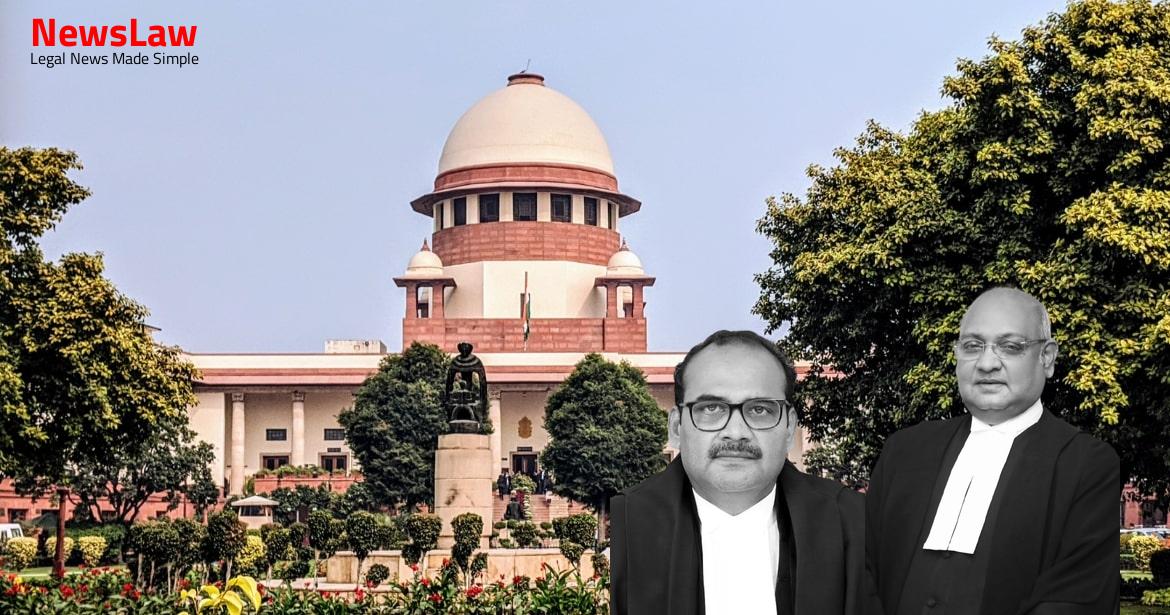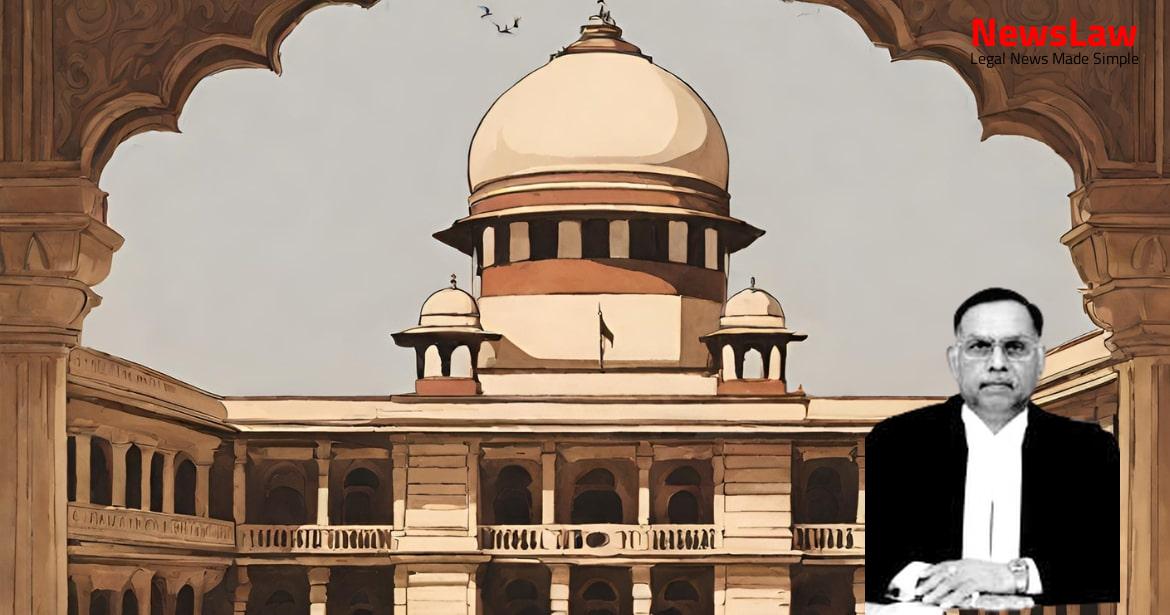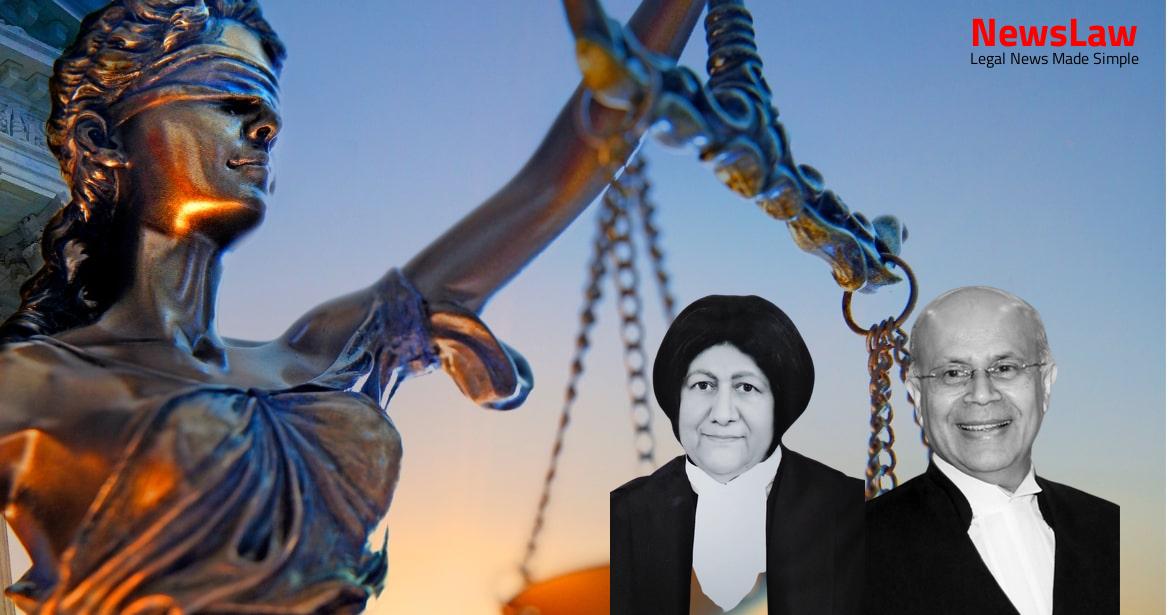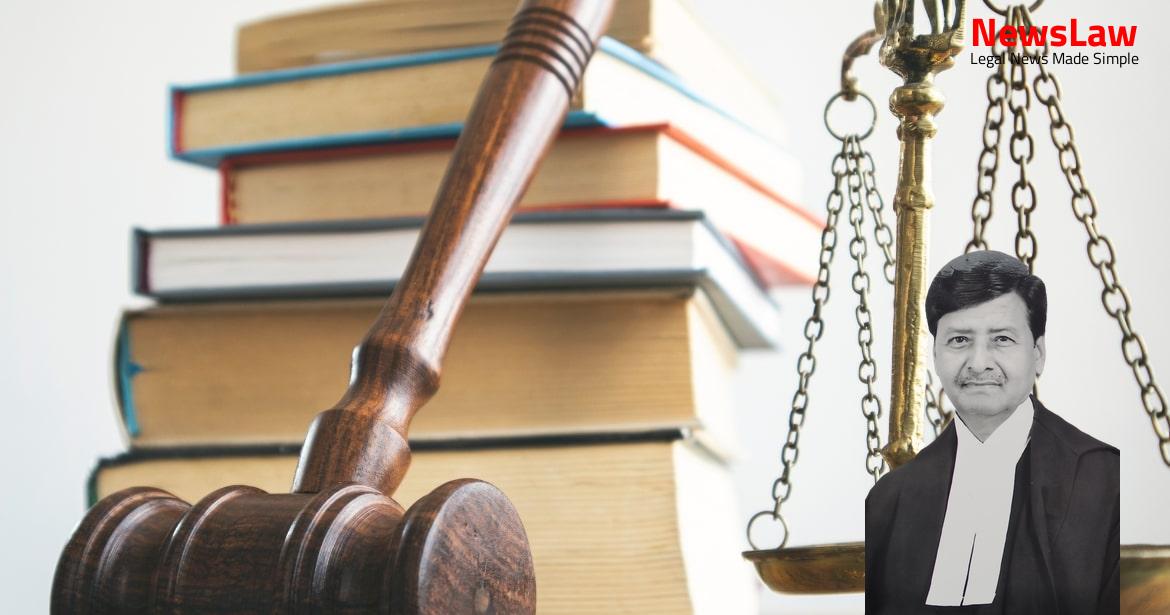In a recent legal case, the Court delved into the complexities of representation matters and the doctrine of res judicata. The focus was on the Court’s legal analysis, emphasizing the significance of prior judgments, statutory directions, and the principles of equity and justice. The decisions reflected the Court’s commitment to upholding the rule of law and ensuring finality in legal disputes. Let’s unravel the insights provided by the Court in this intriguing legal scenario.
Facts
- The High Court dismissed the writ petition filed by the alleged GPA holder criticizing the Trial Court judgment.
- Multiple applications were filed under Order III Rule 2 of CPC for representation in civil proceedings.
- Similar applications were filed in various civil suits for permission to represent the plaintiff in person.
- The contesting respondent challenged the orders allowing representation by the GPA holder in the High Court.
- The appellant alleged unawareness of a civil suit and detrimental decree obtained fraudulently.
- The Trial Court allowed applications for representation by the GPA holder while rejecting objections by the contesting respondent.
- The wife of the 1st respondent filed applications under Order III Rule 2 of CPC for representing her husband in civil proceedings.
- The appellant executed a GPA in favor of the 1st respondent, who prosecuted a civil suit for partition.
- The petitions filed under various rules were challenged and dismissed, leading to revisions.
- The Court clarified that the wife of the appellant can appear as a power agent but not in her professional capacity as a lawyer.
- The Trial Court and the High Court decided that the appellant’s wife, who is an advocate, could represent her husband as a GPA holder.
- It was clarified that she would represent him as a power agent and not in her professional capacity as an advocate.
Also Read: Challenging the Maintainability of Public Interest Litigations: A Court’s Legal Analysis
Arguments
- The petitioner contends that the 1st respondent, who is the GPA holder, is not authorized to participate in the cross-examination of witnesses as it goes against the orders of the Hon’ble High Court in CRP 1784/2018.
- The petitioner argues that the respondent, being an advocate, cannot plead or cross-examine without filing a vakalatnama and that the jurisprudence does not allow an advocate to appear as a power of attorney holder.
- The petitioner relies on the doctrine of res judicata, citing various judgments to support the argument that the issue of the wife of the appellant representing him in her capacity as GPA holder has already been concluded in previous orders and cannot be reopened.
- The petitioner objects to the 1st respondent, who is the GPA holder, cross-examining witnesses on behalf of the plaintiff, stating that it is against the rules and the respondent should only engage a counsel for representation.
- The petitioner seeks a declaration to prevent the 1st respondent from cross-examining witnesses due to her role as the GPA holder of the plaintiff.
- The respondent argues that she was previously permitted by the court to represent the 1st plaintiff, who is her husband, in person and that it is her decision whether to continue representing in person or engage a counsel.
- The respondent cites relevant judgments to support her position that there is no bar for her, as an advocate and the wife of the plaintiff, to represent him as his GPA holder.
- The respondent contests the petitioner’s objections, stating that the petitioner has no authority to direct her on how to conduct the case and that the previous orders of the High Court do not operate as res judicata in the current proceedings.
- The 1st respondent was permitted to represent the 1st plaintiff in person.
- The respondent, as the wife and GPA holder of the plaintiff, can represent the 1st plaintiff in this matter.
- The respondent is not representing the Court in her professional capacity as an advocate.
- The petitioner cannot object to the respondent’s entitlement to represent the plaintiff, as she was previously permitted to do so.
- The bar enshrined in CRP 1784/18 does not apply, as the respondent is not representing the Court as an advocate but as the plaintiff’s representative.
- The respondent, as a GPA holder, is allowed to cross-examine witnesses on behalf of the plaintiff.
Also Read: Legal Interpretation of Committee Continuity in Municipal Corporations
Analysis
- The doctrine of res judicata is fundamental and serves the public policy that a judicial decision must be accepted as correct.
- Section 32 of the Advocates Act allows non-advocates to appear before a court with permission.
- The High Court’s previous orders in this case, dated 20.04.2018 and 14.12.2018, restricted the wife of the appellant to only act as a power agent and not as an advocate.
- The High Court’s mischaracterization of the issue and misapplication of previous orders led to errors in the judgment dated 28.06.2019.
- The previous orders operate as res judicata, barring the re-agitation of the issue concerning the capacity of the wife of the appellant.
- The High Court’s decision was erroneous and failed to consider the binding precedents and statutory provisions.
- The power agent can appear in person as a power agent or engage an advocate herself, as confirmed by the trial court orders.
- Statutory directions and prohibitions cannot be overridden by previous judgments between parties.
- The principles of res judicata apply to prevent endless litigation and maintain the rule of law.
- The wife of the appellant is permitted to act as a power agent and not as an advocate, as per the binding orders.
- Conflicts of interest and other contentions are irrelevant in light of the previous legal determinations.
- The High Court’s dismissal of the petitions was based on misdirection and misapplication of legal principles.
- The Court upheld the trial court’s orders allowing the power agent to act on behalf of the respondent.
- In the case of Allahabad Development Authority, the Court held that Section 11-A of the Act of 1894 would not apply in cases where possession had already been taken and the land vested in the State.
- The doctrine of res judicata is not solely based on Section 11 CPC but is founded on principles of equity, justice, and good conscience.
- Res judicata is meant to provide finality to legal decisions and prevent individuals from being subjected to repeated litigations for the same cause.
- Public policy and necessity underlie the doctrine of res judicata, ensuring an end to litigation and preventing oppression under the guise of the law.
- Res judicata is a rule of universal law that is crucial for the administration of justice and upholding the rule of law.
- The doctrine of res judicata extends to all courts and binds parties to legal proceedings, regardless of the form of the proceeding, to ensure a conclusive end to legal disputes.
- Even erroneous decisions by a court of competent jurisdiction remain binding on the parties involved and concerning the same issue.
- The doctrine of res judicata applies to both subsequent proceedings and subsequent stages of the same proceedings, ensuring that legal decisions are respected and not repeatedly contested.
- Power of Attorney Act defines ‘power-of-Attorney’ to include any instrument empowering a specified person to act for and in the name of the person executing it.
- Persons holding POA are authorized to make applications and act on behalf of other parties.
- Advocates Act defines ‘Advocate’ as an advocate entered in any roll under the Act.
- CPC defines ‘Pleader’ as any person entitled to appear and plead for another in court.
- Order III CPC deals with recognized agents and pleaders for making appearances and applications in court.
- Section 32 of the Advocates Act allows the Court to permit non-advocates to appear in specific cases with prior permission.
- The Act empowers the Court to allow appearances by non-advocates in particular cases.
- An advocate enrolled under the Advocates Act has the right to practice law in any court.
- A Power of Attorney can execute instruments or act on behalf of the donor.
- Section 4 of the POA Act requires verification of affidavits and deposition in the High Court or District Court.
- The 3-Judge Bench decision of this Court in the case of Mathura Prasad Bajoo Jaiswal & Ors. v. Dossibai N. B. Jeejeebhoy : (1970) 1 SCC 613 has been strongly relied upon in this regard.
- The apprehension suggested in the submissions made on behalf of the respondent regarding the operation of Section 32 of the Act of 1961 not being confined to non-advocates is unnecessary and overexpansive.
- The permission under Section 32 of the Act of 1961 is granted on a case-to-case basis and can be refused based on the specific facts and circumstances of a particular case.
- The concern about unscrupulous advocates circumventing legal consequences by appearing as power of attorney holders is deemed irrelevant in the present case.
- The submissions on behalf of the contesting respondent and counterarguments by the appellant do not need further discussion based on the features and factors of the present case.
Also Read: Dispute over Insurance Claim for Home Loan
Decision
- These appeals succeed and are allowed.
- The impugned common order dated 28.06.2019 is set aside.
- The orders passed by the Trial Court dated 07.02.2019 are restored.
- The costs of this litigation in this Court shall follow the decision in the main proceedings by the Trial Court.
- The petition is dismissed.
Case Title: S. RAMACHANDRA RAO Vs. S. NAGABHUSHANA RAO (2022 INSC 1114)
Case Number: C.A. No.-007691-007694 / 2022



